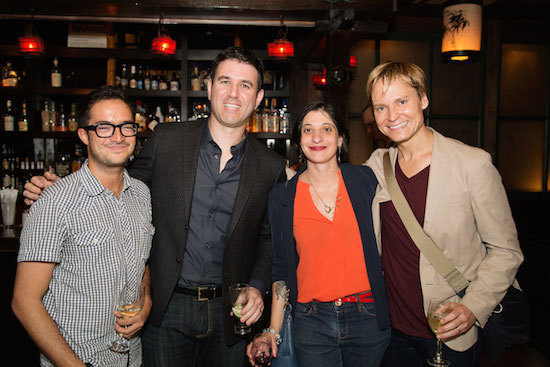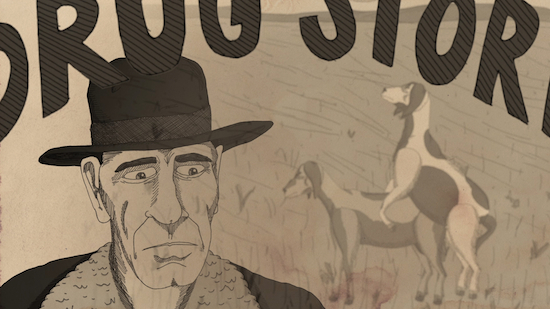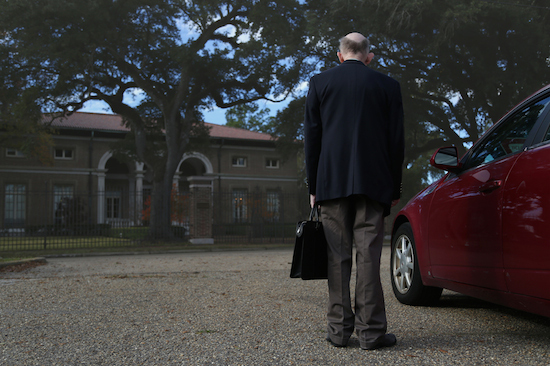TFI/The Orchard Cocktail Reception: Pictured (Far left) José Rodriguez; Director of Documentary Programming at TFI, Paul Davidson, SVP of Film & TV at The Orchard, Danielle DiGiacomo, Director of Acquisitions at The Orchard and Ryan Harrington; VP of Artist Programs at TFI
When I first started attending the Tribeca Film Festival and the events at Tribeca Film Institute, I didn't have the depth of understanding I have today. I knew the film festival and TFI had been born out of a beautiful gesture, to give back to a community deeply in need after the tragedies of 9/11 by encouraging a sense of commerce and neighborhood once again. But I'll admit that didn't always sink in as I watched incredible films and attended TFI events like the Tribeca All Access programs. My mind was filled with only their great entertainment value.
Later I grew to understand that films, and in particular documentaries, could help decode the world around me. It was then I realized the power of cinema, and how using it to build bridges could reconcile this divided world of ours.
This idea, the concept of cinema as a hand across cultures, is exactly what the TFI Documentary Fund is about. From a festival that began to heal a city, to a program and their funds that continue to mend the world through cinema, TFI is high on my list of groundbreaking, life-changing organizations. Many may have tried to imitate it but none have even come close.
So when the Tribeca Film Institute announced earlier this month that they are joining forces with multi-platform, forward thinking distribution company The Orchard (as TFI Documentary Fund's new Presenting Partner), I was not only intrigued but also excited by the possibilities. Distribution of non-fiction films has to evolve to a new model (perhaps several models), the format of documentaries constantly reinvented if audiences are to be lured into watching the works of filmmakers who, with their beliefs and passion, could change the world.
I turned to Ryan Harrington, VP of Artist Programs at TFI, plus filmmakers and past TFI Documentary Fund recipients Penny Lane (Nuts, the Brinkley Story), Sam Cullman and Jennifer Grausman (Art and Craft), Chapman Way (The Battered Bastards of Baseball), Geeta V. Patel and Ravi V. Patel (Meet the Patels) for the answers, the inspiration and just the perfect words to explain what I could only instinctually sense was an enormous step forward for cinema.
I know that documentary filmmakers are near and dear to your heart. What makes a documentary important in today's global atmosphere? Why should we watch them?
Ryan Harrington: People often overlook the fact that documentary film is a creative art form and that doc filmmakers are storytellers. I love the doc format because the creative possibilities are endless.
Documentaries are a reflection of the world we live in. They offer distinct points of view and allow audiences to question their own beliefs, and experience different perspectives and opinions.
So what are the best aspects of this new partnership with The Orchard?
Ryan Harrington: As I'm sure you're aware, finding funding for creative documentaries, especially those that might not fit into the "social issue" category is tremendously difficult. The Orchard provides TFI with a wonderful flexibility to fund what I like to call -- "great movies that just happen to be documentaries." Can these films be urgent and message-driven? Absolutely! But we are also able to fund films that are focused on art and culture, and those that might stray into the experimental or hybrid area. The Orchard and TFI share a very similar vision. We both have an unwavering commitment to supporting creative, risky and artful storytelling.
Why did you choose to make a documentary about your subject, and not a fiction film?
Penny Lane: My film is so weird it's barely even a documentary. Half of it is made up of animated reenactments. And it's a story about a conman, and he lied all the time, so dealing with his "true life story" is pretty tricky. But to answer your question: Brinkley's story is already the craziest thing you've ever heard and it's "true." I just don't feel any interest in making stuff up when the real world keeps throwing all these incredibly strange stories in my lap.
Geeta V. Patel: There is nothing more powerful than real life... and capturing a story that we can all relate to but sometimes can't put into words. "You had to be there" you know?
Ravi: V. Patel: This all happened by accident. If I knew how hard it would be, I would have never chosen it! That said, it will probably be the most important accomplishment of my life, at bare minimum for how much closer it's brought my family together.
Why does TFI stress the concept of character-driven documentaries?
Ryan Harrington: Characters are the hearts and souls of the films we support. They are the reason stories resonate with audiences. No matter what kind of documentary we are supporting, we look for characters that will take us on a journey with them. These types of documentaries are generally also more cinematic in scope and ambition.
What was the most positive aspect of applying for the TFI Documentary Fund?
Ravi V. Patel: I can remember a few specific times when we were in a bind and it felt like nobody wanted anything to do with Meet the Patels... and Ryan Harrington, Beth Janson, and their team were on the phone with us making miracles happen, using every resource they had both personally and professionally, to support what this film needed. They never questioned our failures as lack of ability, but rather embraced our process because they could see the final vision. That kind of support comes from talented filmmakers supporting filmmakers. Tribeca Film Institute, through the Doc Fund and other grants, works with both sides of the brain.
Sam Cullman: Working with the team at Tribeca Film Institute was an incredibly positive experience and we are so grateful for all the guidance, support and attention that Ryan, José [Rodriguez] and Alexandra [Hannibal] were able to give our project and us as filmmakers. TFI's grant came at a crucial time for Art and Craft -- about midway through production when we had run out of funding, but needed to cover some important and time sensitive/ developing aspects of our story. And while the award allowed us to continue production, over time (and especially after attending the Tribeca All Access meetings in 2013), we saw that the TFI stamp of approval helped us secure other support from organizations like the Jerome Foundation, Sundance and NYSCA, from executive producers, individual donors and also through Kickstarter.
Jennifer Grausman: Applying to the fund also forced us to hone our fundraising materials -- trailer and treatment -- at an early stage, which also led to other funding opportunities.
What becomes easier now with the addition of this broad spectrum distribution company?
Ryan Harrington: First off, it provides the storytellers receiving these grants with nonbinding options regarding their distribution goals. The Orchard and TFI will work with the grantees early on to strategize about the best ways to deliver their films to audiences. The distribution landscape is changing as dramatically as the funding landscape and we hope that these grants will empower filmmakers to fully realize and embrace the flexibility and access that they provide because, at the end of the day, we are looking to support filmmakers who are making art for an audience.
Why would you recommend TFI to fellow filmmakers, what do they do differently than other cinematic organizations?
Chapman Way: TFI does a tremendous job advocating for your project and helping you network with others -- we met our Executive Producer through their market meetings. They're also one of the few granting organizations that supports character-driven stories and documentaries that lie outside the social issue genre and I believe TFI has been instrumental in helping guide some of these projects.
Geeta V. Patel: They support films with a crafted, thoughtful, and creative approach. In essence, they are just as creative as the filmmakers, and this makes them incredible partners for finding ways to get the film to the finish line. Ryan Harrington and Beth Janson always believed in Meet the Patels, and they fought hard to give it a platform, even when it wasn't getting into festivals. They saw the potential and listened to their own hearts, not the naysayers. Now that the film has received awards and will be getting a wide release, it's incredible to think that they always believed this would happen.
Sam Cullman: Really what sets TFI apart, is their focus on supporting the craft of documentary work. Unlike so many other foundations that champion documentaries, TFI does not prioritize projects with an overt political or social cause -- and in so doing it helps films that might otherwise never get made, breathing life into a form of non-fiction filmmaking that lives and dies in the storytelling.
What was the application process like, a personal anecdote?
Chapman Way: A couple of months after submitting, we got a call from TFI informing us we had made it to the final round and would be notified of their decision in two weeks' time. The next fourteen days were truly anxiety ridden. At the time, we were working any and all side jobs to scrap together some funds for production. So, the possibility of winning $30,000 was life changing.
Penny Lane: I applied for this grant, with the same film, several times before I got it. On the one hand, this is an embarrassing thing to admit; on the other hand, I think it's important for makers to publicly acknowledge more frequently the amount of rejection usually hiding behind even what appears to be a "successful" career.
I was at lunch with two friends (both also doc filmmakers) when I received the award email. We had actually been commiserating about how difficult fundraising is, and how much rejection is inherent in the process and how thick your skin has to be. And I said (no joke!) when my phone pinged with the email from TFI, "Oh look, here's another rejection now!" It was a memorable moment for sure.
And finally, Ryan, submissions opened on June 15th for the next wave of grants. What are you looking for at TFI in a pitch?
Ryan Harrington: A strong visual approach. Fearless storytelling. Unique characters. Interesting access. Give me goosebumps!
For TFI Documentary Fund submissions and info, check out the TFI website.
Photographs courtesy of the Tribeca Film Institute and the filmmakers, used with permission.



